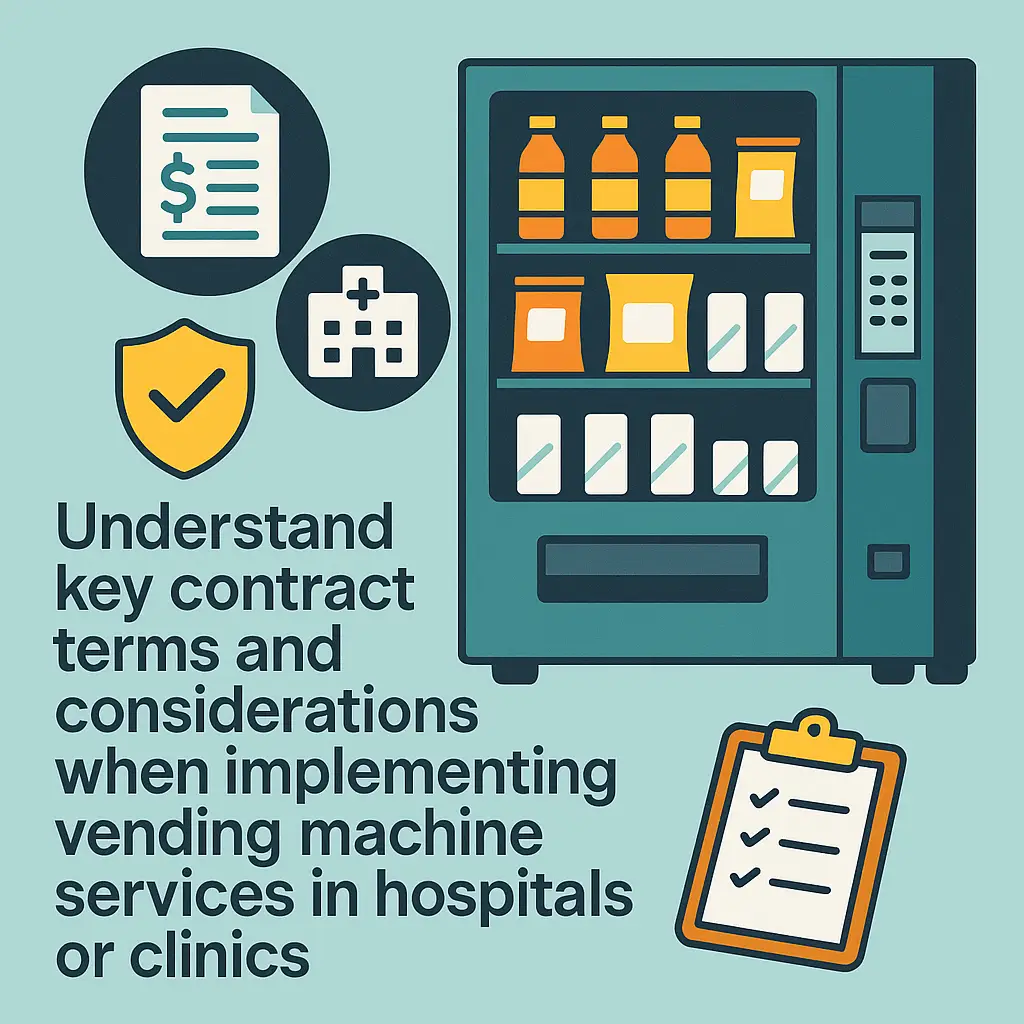Vending Contracts for Healthcare Facilities
Understand key contract terms and considerations when implementing vending machine services in hospitals or clinics.
Back to Vending for Healthcare ResourcesUnderstand key contract terms and considerations when implementing vending machine services in hospitals or clinics.
Back to Vending for Healthcare ResourcesFacilities should confirm clear repair terms, product standards, and payment technology requirements before finalizing any agreement.
![]() Define maintenance and repair responsibilities in vending agreements
Define maintenance and repair responsibilities in vending agreements
![]() Include dietary compliance and healthy product standards in contracts
Include dietary compliance and healthy product standards in contracts
![]() Review revenue-sharing and payment technology terms before signing
Review revenue-sharing and payment technology terms before signing

Vending contracts in healthcare facilities play a critical role in shaping service quality, product availability, and long-term convenience. Clear agreements protect hospitals and clinics from unexpected issues and ensure patients, staff, and visitors have reliable access to food, drinks, and other items.
Hospitals and clinics rely on vending for quick, convenient options. Without strong agreements, facilities may face broken machines, expired products, or delays in servicing. A well-structured contract ensures consistent quality while outlining responsibilities for both sides.
One of the most important elements is defining who is responsible for regular maintenance and repair. Healthcare settings demand reliable machines, so contracts should clearly state expected response times for repairs and how preventive servicing will be handled.
Healthcare environments often require nutritious and compliant product offerings. Contracts should specify healthy snack options, allergen labeling, and dietary accommodations. Clear product requirements protect facilities from stocking items that conflict with wellness goals.
Many vending contracts include commissions or flat fees. Healthcare facilities should review these terms carefully to understand how revenue is calculated, how payments are distributed, and whether these terms align with organizational goals. More details about financial arrangements can be found in resources like nursing home vending agreements.
Today’s healthcare vending services often include contactless payments, mobile wallets, and smart vending tech. Contracts should confirm whether these technologies are included, as they improve hygiene and accessibility for both patients and staff. For further insight, see how touchless vending in hospitals addresses hygiene concerns.
Finally, contracts should address flexibility. Facilities may grow, change, or require different machine types over time. Exit clauses protect hospitals and clinics from long-term commitments that no longer fit their needs.
If you're exploring vending options for your business, Vending Exchange can help simplify the process. Delivery, Installation and Equipment is provided at no cost to you - vendors provide the machines, keep them stocked, and handle all servicing. Whether you need a provider or full-service management, just fill out the form on this page to get started.
Contracts should specify repair response times, preventive maintenance schedules, and who handles costs.
Facilities should include clear product guidelines covering dietary compliance, allergens, and nutrition.
Yes, many outline commission percentages or flat fees tied to sales volume.
Contactless and mobile payment terms improve hygiene and convenience in healthcare settings.
Agreements should state timelines for removal and replacement of expired or damaged stock.
Yes, product mix requirements can be negotiated and written directly into the contract.
Include exit clauses, performance standards, and flexibility for changes in machine types.
No, some contracts include flat monthly fees or hybrid models depending on sales volume.
Terms should clarify whether upgrades to new machines or technologies are included.
Most contracts specify installation timelines, often within one week of signing.